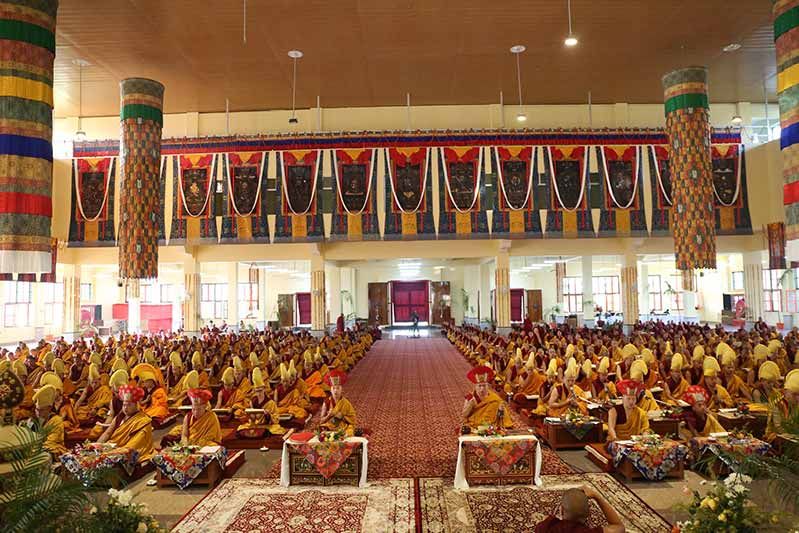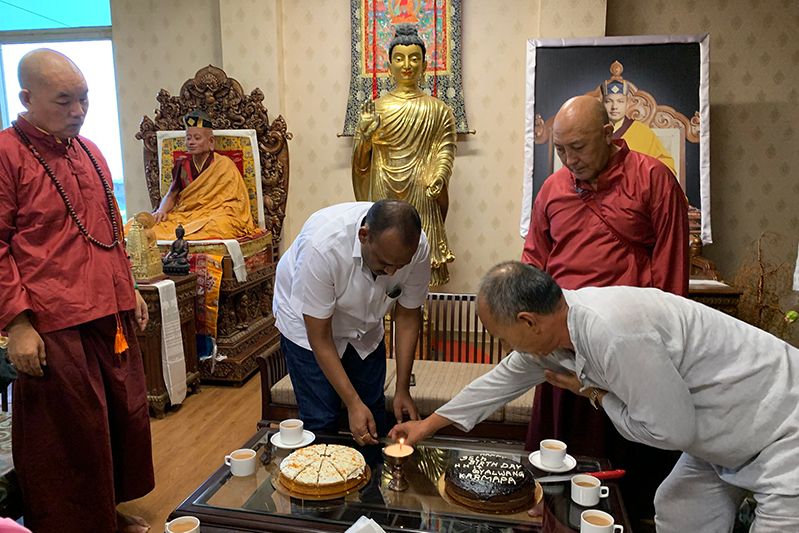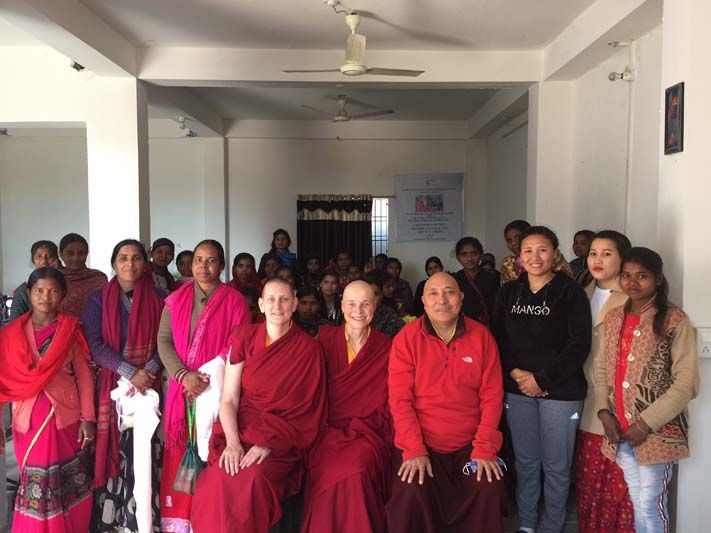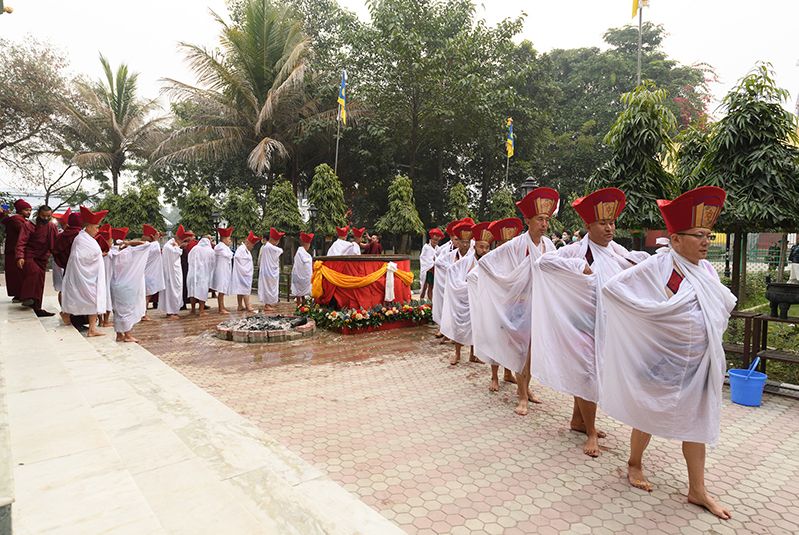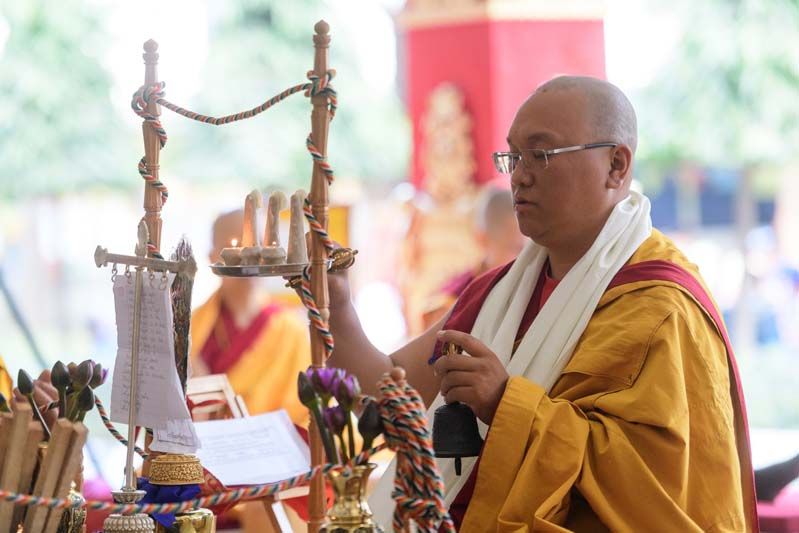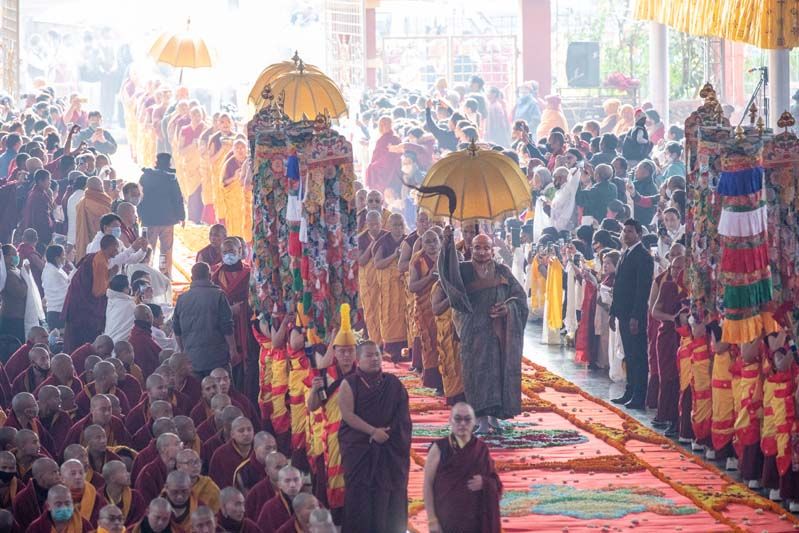HE Goshir Gyaltsab Rinpoche on Mind Training: The Seventy-Two Exhortations Day Four: The End Result is Liberation
- February 5, 2020
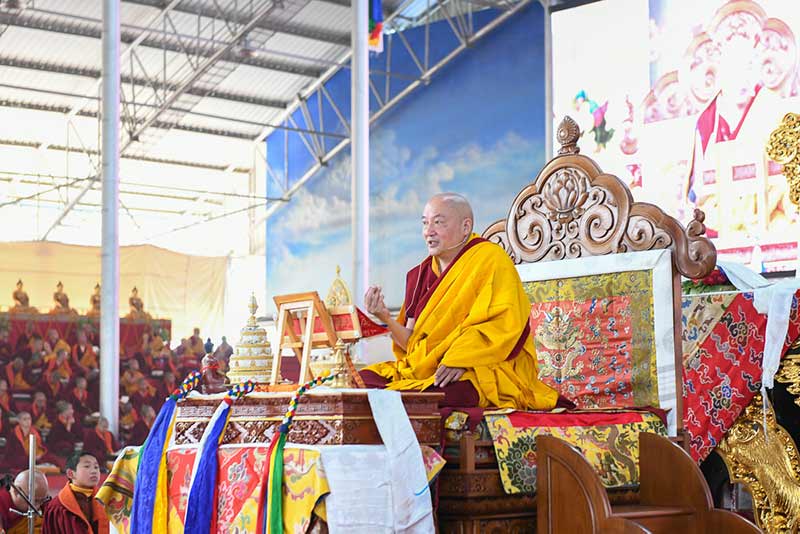
Monlam Pavillion, Bodhgaya,
February 5, 2020
On the final day of the morning teachings, everyone was overjoyed to see that young Bokar Yangsi Rinpoche and his tutor, Khenpo Lodro Donyo Rinpoche, had arrived.
HE Goshir Gyaltsab Rinpoche resumed his commentary at verse 38.
With all the powers in our being,
Keep cleanly without any stain
The precious training in discipline—
The cause of gaining a precious human body.
Rinpoche emphasized the need to train in ethical discipline and keep vows purely, whether a monastic or a layperson. In order to obtain the bodies of gods and humans — the best in the six realms— one needs generosity, as well as moral discipline.
They stir up the mind and harm the body.
They’re condemned by the learned and venerable.
They are the origin of all wrongs—
Give up alcohol and sex. [Verse 39]
The causes of all faults in Samsara are alcohol and sexual desire.
When we feel overly helpful toward
The women among our disciples,
Desire masquerading as compassion
Can create obstacles for dharma. [Verse 40]
For a teacher there is the additional danger that sexual desire can be mixed with compassion; in other words sometimes sexual desire can be confused with compassion for the student and this creates obstacles to practice.
To conquer the enemy afflictions,
Who create suffering for we,
Do not be afraid or discouraged.
Rouse the pride of confidence.
In samsara, Rinpoche commented, there are limitless sufferings caused by the afflictions. We should live in the hope that eventually we will be able to abandon these. The afflictions are easier to eliminate than worldly enemies because they are misconceptions and once one has the prajna from listening, contemplation and meditation, it is easy to give them up. This is not true with a worldly enemy. With a worldly enemy, temporary victory is possible but eventually they will return seeking revenge. Even if we eliminate them, there will be others who will try to harm us. Even if we can eliminate all of our enemies, in the next life we will be reborn in the hell realms. Hence there is no way to eliminate worldly enemies. But with the afflictions it is possible to give them up and there is no one to seek revenge: “It’s really impossible to fully eliminate your enemies. But with the afflictions, listening, contemplating, and meditation — especially meditation — will give you the confidence to abandon them. This is beneficial. There’s no ripening, no allies on their side. It’s extremely easy.”
Just as bleeding and burning
Are cures for internal illnesses,
The severe austerities of dharma are means
To cure the sufferings of the lower realms.
Don’t be too delicate and afraid. [Verse 42]
Practitioners fear austerity but much greater hardships face us if we fail to practice. We need to be stalwart not too delicate, Rinpoche advised.
If you are unable to endure
Such present sufferings as these,
Your hope to endure the sufferings
Of the three lower realms is deluded. [Verse 43]
If we are unable to bear our present sufferings how could we bear the sufferings of the lower realms, yet we are accumulating the causes to be reborn in the three lower realms. Verses 44-46
If you will not gain a precious human body
By behaving in the way you do,
The high view of hoping to achieve
Buddhahood is mistaken.
You’ve gained what’s difficult to get,
The precious human body with leisures and resources.
Don’t let what you’ve got disappear—
Grow the everlasting crop.
Meditate on rejoicing in the virtue
That others do. If you’ve an urge
To do what you should not, restrain
The movements of your body and speech.
If we cannot practice pure discipline and samadhi in this lifetime, there is no hope of buddha-hood. It is better to endure the challenges of this lifetime and to make the most of the opportunities afforded by this human body, than to fall to lower realms and suffer their torments with almost no hope of escape.
Kharak Gomchung’s next verses give us the tools to do so, emphasizing yidam deity practice, mindfulness, and contemplation.
The source of supreme and common siddhi,
It dispels your own and others’ obstacles.
Exert yourself without any doubt
In the practice of the yidam deity. [Verse 47]
Once the drunken elephant of mind
Has been dragged away from wrong objects,
The gale of the afflictions will blow,
So hold it with the rope of mindfulness.
The mind is the most powerful of things, so we have to retrain our mind otherwise we will experience terrible suffering.
It’s hard for the low-walled house of words and listening
To withstand the armies of afflictions.
To build the tower of certainty,
Strive hard at contemplation and meditation. [Verse 49]
Generally, we need to practice all three trainings: listening, contemplation, and meditation. Just listening is not enough. The low wall of the house can easily be scaled and the house destroyed by enemies; it cannot be defended. If we contemplate the meaning of what we have heard, it will become stable, and if we meditate it will become manifest. So practicing these three combined is like building a high tower which the enemy cannot scale and we will be able to eliminate them.
In the final section of this “Virtue in the Middle” part of the text, Kharak Gomchung elaborates the different capacities of dharma practitioners. The lesser practitioner wishes mainly to avoid suffering in coming lives; the middling practitioner wishes to achieve buddhahood for him or herself; and the greater practitioner practices to bring all sentient beings without exception to buddhahood. Rinpoche summarized these verses in an efficient treatment of familiar themes: the reality of impermanence, the dangers of karma and the afflictive emotions, the sufferings of samsara, and the value of equalizing self and other. He asked the assembly to meditate for one minute on the sufferings of samsara, and for another half minute or so on bodhicitta, the desire to help all our mothers throughout space attain precious enlightenment
Verses 50-51:
Free yourself with the human boat
From the great river of suffering.
Such a boat is hard to get again.
Now that you’ve got it, don’t be lazy.
What’s built falls down, what’s gathered is left behind.
You will leave your close relatives
And go all alone, but who knows where—
A traveler should not plan too much.
‘Traveler’ here in the text can also mean a person in a dream or illusion, Rinpoche explained. Samsara should be regarded as a dream.
There’s no place you can stay without dying.
Death is certain and will come soon.
Nothing can help you when you die.
Always keep a sense of urgency [Verse 52]
Every moment, all of our friends, our family members, and we ourselves are rushing closer towards death and impermanence. We don’t have time to waste; hence we need the sense of urgency.
Now you have a choice between
The lasting pleasure of higher realms
And the suffering of the lower realms.
Ponder this earnestly. [Verse 53]
Now is the time when we have a human body and have a choice. Consequently, we have to think seriously about what we want to achieve. Verse 54-55:
Vile actions such as fraud, deceit,
Cheating, lying, and taking what’s not given
Produce the sufferings of the lower realms.
Give up bad actions and misdeeds.
The pleasures of this life are fleeting.
If you want lasting happiness,
While you are able to accomplish something,
Strive at virtues like generosity.
Rinpoche explained that these two verses described the path for the person of lesser capacity. All these faults are causes for rebirth in the lower realms and need to be abandoned. ‘Fraud’ here means pretending to have qualities which we lack, and ‘deceit’ means trying to fool other people. The pleasures of this life only last a few years and so now, while we have the ability should strive at causes for lasting happiness, accumulate virtue and practise generosity.
The text now describes the path for those of middling capacity.
Verses 56 – 59
Everything is the deceit of illusion.
Beside the three jewels, there is nothing
That, if you trust it, won’t deceive you,
So always go for refuge.
Those in samsara have no happiness.
The three and eight types of suffering,
Like cancer, torment people.
Meditate on the defects of samsara.
Grasping is the cause of suffering.
Discard through the path of selflessness
The origin, karma and afflictions.
Cultivate the qualities of peace and happiness.
From anger, you jettison your own aims
And sadden friends and relatives.
Don’t throw the poison dart, harsh words;
Give up your ill nature—hatred.
There is no happiness in samsara; it’s like a place on fire. The teaching halted for a moment as Rinpoche led a meditation on the sufferings of samsara.
He continued with Verse 58: the afflictions are given up by attaining the prajna of selflessness by meditating on emptiness. If we want to pacify our suffering we have to cultivate the twelve qualities of peace. Verse 59: anger and hatred destroy our own aims and purposes and make life for others unpleasant and unhappy. We should give them up.
From Verse 60 onwards, Kharak Gomchung begins to outline the path for those of greater ability.
You and other beings are the same
In wanting pleasure and not wanting pain.
Extrapolate from your own experience;
Meditate that you and others are equal.
We should consider not just our own liberation but the liberation of others too. Extrapolating from our own experience, we should reflect on how all sentient beings share the wish for pleasure and the avoidance of pain, and need to be liberated.
For the kind beings of the three realms,
Who’ve been your parents in past lives,
Abandon all malice and hostility
And cultivate loving-kindness and compassion [Verse 61]
We need to abandon negative actions and cultivate loving kindness and compassion.
When you cause harm to sentient beings,
The compassionate victors feel
Like parents whose only child is killed.
There’s no way at all that it could please them. [Verse 62]
Harming a child, harms its parents too. The compassion of a buddha for sentient beings is even greater than the love parents have for their children, and hence when we cause harm to other sentient beings it displeases them.
All the sufferings of samsara
Arise from the cause, karma and afflictions.
Those arise from conceiving of a self,
So look at egolessness. [Verse 63]
This verse refers to the formal practice of meditation, rather than post-meditation. The idea of self is a misconception. If we look carefully, we cannot find it. We need to use analytical meditation to examine this. Is it inside or outside our body? [There was another short at this point.]
In Verses 64 – 65, Kharak Gomchung summarises nature of mind practice.
Free of apprehender and apprehended,
Your own mind has never arisen.
It is beyond the sphere of intellect,
So you must be free of all desires.
A beginner’s realization is clear,
But it has no stability.
Don’t toss it on the winds of thought;
Hold it with the rope of mindfulness.
No nature at all can be established,
So it’s inherently free of the four extremes.
Within that, no mind can be conceived,
So be free of any thought of an apprehender
The ‘I’, if we break it down, apprehender and apprehended, Rinpoche explained, do not exist. The ultimate nature of mind has no beginning or end. We cannot grasp it because it is transcendent. Yet, we keep on grasping at a self as truly existent. We need to be free of all these misconceptions and projections. The mind is indescribable and inconceivable. It is neither something, nor is it nothing. It is also taught as being free of elaboration and luminous. The Lord Buddha taught this in many ways but it is beyond conception. The ultimate nature cannot be realised through mere words, yet, through the blessings and power of Buddha Vajradhara and Buddha Shakyamuni, we may attain some realisation. Even today, Rinpoche asserted, there are people who receive realisation of the ultimate nature through the power of blessings. Beginners can have realisation, clear for a moment, a thought comes, and then we lose it, like clouds covering the sun in the sky. The realisations aren’t stable because in samasara there are many distractions.
We need to continually remember and meditate on the ultimate nature—day and night.
The great Kadampa masters of the past stayed away from people where possible and spoke little, because these are disturbances to meditation. In the histories there’re are stories of Kadampa masters who, having received instructions form their teachers, would go into retreat and vow to avoid all two-way conversations. Spending two to three hours chatting with friends in a restaurant can stir up thoughts and affect meditation.
Our human life is like a battery that is constantly running down, Rinpoche warned, and nobody knows when death will come. For those of us who have been in retreat or received mahamudra instructions and begun meditation, there is a real danger that such situations will be counter-productive and increase our thoughts.
Then comes a section on the illusory nature of all phenomena.
Verses 67
Phenomena are all like dreams and illusions.
There is no true thing at all.
Do not have too much fixation
For things that appear, though nonexistent.
We should constantly remind ourselves of this in order to decrease our attachments.
Verses 68 -69:
Like causes and effects in dreams,
Though not established in the actual nature,
Karma and results of the confused are unfailing—
Give up misdeeds and strive at virtue.
Cultivate regret for your past misdeeds,
And from now on, refrain from them,
Even if it should cost your life.
Always strive at the antidote,
The virtue of refuge and bodhichitta.
Gyaltsab Rinpoche highlighted the importance of reciting the Sutra in Three Sections daily in order to purify our past misdeeds. The antidote mentioned here is daily refuge and generation of bodhichitta. These are the essential antidotes to misdeeds.
Even a trifling virtuous thing
Will become an inexhaustible result.
Precede all dedications of the three times
With the resolve of bodhichitta. [Verse 70]
Rinpoche stressed that even a small virtuous action can become vast.
The final section of the Exhortations—virtue in the end—begins at Verse 71 and the text concludes with Verse 72.
If your mind comes into harmony
With this advice, you will be freed
From all suffering in the lower realms,
And in the short-term, you’ll gain the pleasures
Of the higher realms of gods and humans.
Ultimately you’ll purify the two obscurations
And have the three kayas and four wisdoms.
You will achieve unexcelled enlightenment
That dwells in neither samsara nor nirvana.
This is Kharak Gomchung’s assurance that if our mind comes into harmony with the advice in the Seventy-Two Exhortations, our sufferings will end, and, as described in Verse 72, the ultimate result of practice will be liberation from samsara.
With a dedication of the virtue, Gyaltsab Rinpoche concluded his exposition of this text.
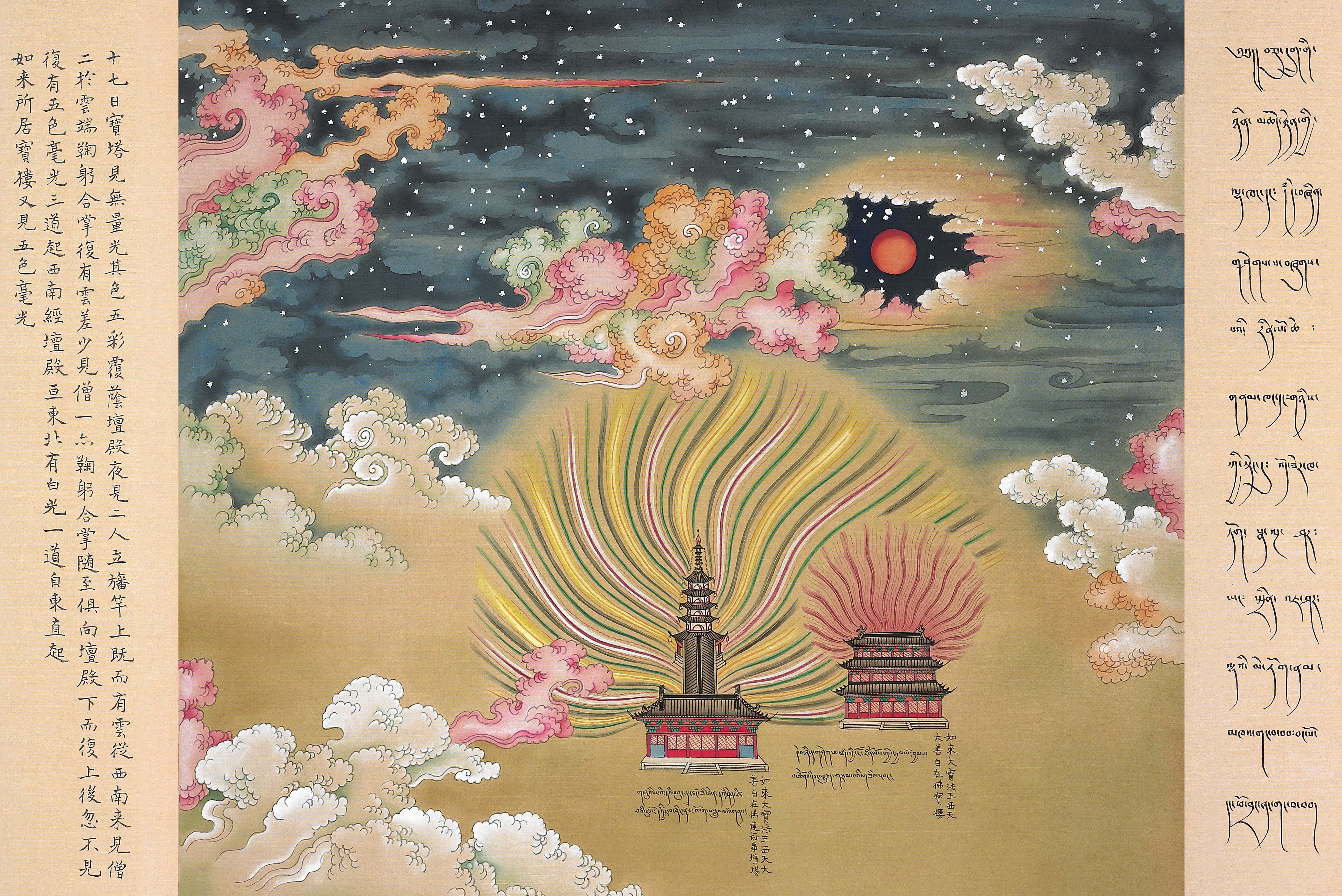
37th Kagyu Monlam Schedule
Tibetan / English / Chinese • French • German • Indonesian • Korean • Polish • Russian • Spanish • Vietnamese
Dharma Teachings
 Meditation Instructions
Meditation Instructions
Recorded during the 37th Kagyu Monlam, Bodhgaya, India. January 28-30, 2020.

